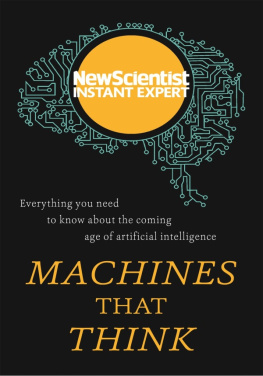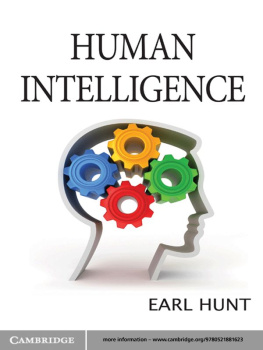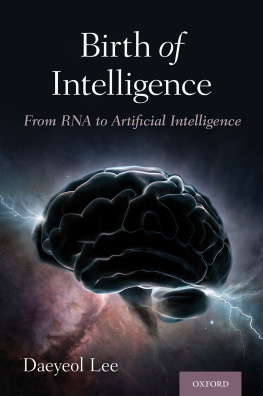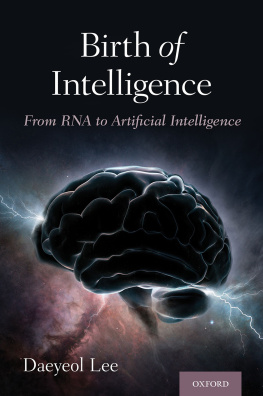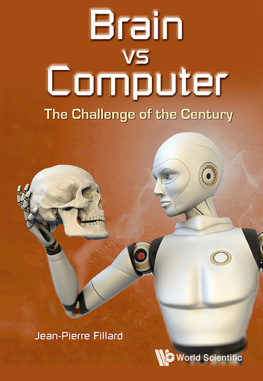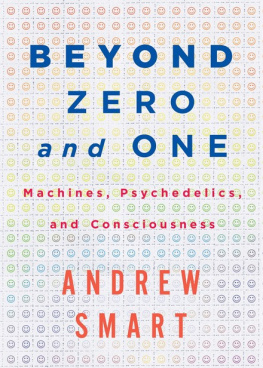FROM THE INVENTOR OF THE PALMPILOT COMES A REVOLUTIONARY NEW THEORY OF INTELLIGENCE AND A BOLD VISION FOR THE FUTURE OF INTELLIGENT MACHINES.
Jeff Hawkins, who created the PalmPilot, the Treo smart phone, and other handheld devices, has reshaped our relationship to computers. Now, with this brilliant book about the true nature of human intelligence, Hawkins stands ready to revolutionize both neuroscience and computing in one stroke.
On Intelligence develops a powerful theory of how the human brain works, explaining why computers are not intelligent and how, based on this new theory, we can finally build intelligent machines. Previous attempts at replicating human intelligencethrough artificial intelligence and neural networkshave not succeeded. Their mistake, Hawkins argues, was in trying to emulate human behavior without first understanding what intelligence is.
The brain is not a computer, supplying by rote an output for each input it receives. Instead, it is a memory system that stores experiences in a way that reflects the true structure of the world, remembering sequences of events and their nested relationships and making predictions based on those memories. It is this memory-prediction system that forms the basis of intelligence, perception, creativity, and even consciousness. Intelligence is the capacity of the brain to predict the future by analogy to the past.
In an engaging style that will captivate audiences from the merely curious to the professional scientist, On Intelligence explains what intelligence is, how the brain works, and how this knowledge will finally make it possible for us to build intelligent machines, in silicon, that will not simply imitate but exceed our human ability in surprising ways.
Written with the acclaimed science writer Sandra Blakeslee, On Intelligence promises to completely transfigure the possibilities of the technology age. It is a groundbreaking book in neuroscience, psychology, and the quest to build intelligent machines.
on INTELLIGENCE
on INTELLIGENCE
JEFF HAWKINS
WITH SANDRA BLAKESLEE


Times Books
Henry Holt and Company, LLC
Publishers since 1866
115 West 18th Street
New York, New York 10011
Henry Holt is a registered trademark of Henry Holt and Company, LLC.
Copyright 2004 by Jeff Hawkins and Sandra Blakeslee
All rights reserved.
Distributed in Canada by H. B. Fenn and Company Ltd.
Library of Congress Cataloging-in-Publication Data
Hawkins, Jeff, 1957
On intelligence / Jeff Hawkins with Sandra Blakeslee.1st ed.
p. cm.
Includes bibliographical references and index.
ISBN 0-8050-7456-2
1. Brian. 2. Intellect. 3. Artificial intelligence. 4. Neural networks
(Computer science). I. Blakeslee, Sandra. II. Title
QP376.H294 2004
612.82-dc22 2004051640
Henry Holt books are available for special promotions and premiums.
For details contact: Director, Special Markets.
First Edition 2004
DESIGNED BY RENATO STANISIC
Printed in the United States of America
10 9 8 7 6 5 4
CONTENTS
on INTELLIGENCE
PROLOGUE
This book and my life are animated by two passions.
For twenty-five years I have been passionate about mobile computing. In the high-tech world of Silicon Valley, I am known for starting two companies, Palm Computing and Handspring, and as the architect of many handheld computers and cell phones such as the PalmPilot and the Treo.
But I have a second passion that predates my interest in computersone I view as more important. I am crazy about brains. I want to understand how the brain works, not just from a philosophical perspective, not just in a general way, but in a detailed nuts and bolts engineering way. My desire is not only to understand what intelligence is and how the brain works, but how to build machines that work the same way. I want to build truly intelligent machines.
The question of intelligence is the last great terrestrial frontier of science. Most big scientific questions involve the very small, the very large, or events that occurred billions of years ago. But everyone has a brain. You are your brain. If you want to understand why you feel the way you do, how you perceive the world, why you make mistakes, how you are able to be creative, why music and art are inspiring, indeed what it is to be human, then you need to understand the brain. In addition, a successful theory of intelligence and brain function will have large societal benefits, and not just in helping us cure brainrelated diseases. We will be able to build genuinely intelligent machines, although they wont be anything like the robots of popular fiction and computer science fantasy. Rather, intelligent machines will arise from a new set of principles about the nature of intelligence. As such, they will help us accelerate our knowledge of the world, help us explore the universe, and make the world safer. And along the way, a large industry will be created.
Fortunately, we live at a time when the problem of understanding intelligence can be solved. Our generation has access to a mountain of data about the brain, collected over hundreds of years, and the rate at which we are gathering more data is accelerating. The United States alone has thousands of neuroscientists. Yet we have no productive theories about what intelligence is or how the brain works as a whole. Most neurobiologists dont think much about overall theories of the brain because theyre engrossed in doing experiments to collect more data about the brains many subsystems. And although legions of computer programmers have tried to make computers intelligent, they have failed. I believe they will continue to fail as long as they keep ignoring the differences between computers and brains.
What then is intelligence such that brains have it but computers dont? Why can a six-year-old hop gracefully from rock to rock in a streambed while the most advanced robots of our time are lumbering zombies? Why are three-year-olds already well on their way to mastering language while computers cant, despite half a century of programmers best efforts? Why can you tell a cat from a dog in a fraction of a second while a supercomputer cannot make the distinction at all? These are great mysteries waiting for an answer. We have plenty of clues; what we need now are a few critical insights.
You may be wondering why a computer designer is writing a book about brains. Or put another way, if I love brains why didnt I make a career in brain science or in artificial intelligence? The answer is I tried to, several times, but I refused to study the problem of intelligence as others have before me. I believe the best way to solve this problem is to use the detailed biology of the brain as a constraint and as a guide, yet think about intelligence as a computational problema position somewhere between biology and computer science. Many biologists tend to reject or ignore the idea of thinking of the brain in computational terms, and computer scientists often dont believe they have anything to learn from biology. Also, the world of science is less accepting of risk than the world of business. In technology businesses, a person who pursues a new idea with a reasoned approach can enhance his or her career regardless of whether the particular idea turns out to be successful. Many successful entrepreneurs achieved success only after earlier failures. But in academia, a couple of years spent pursuing a new idea that does not work out can permanently ruin a young career. So I pursued the two passions in my life simultaneously, believing that success in industry would help me achieve success in understanding the brain. I needed the financial resources to pursue the science I wanted, and I needed to learn how to affect change in the world, how to sell new ideas, all of which I hoped to get from working in Silicon Valley.
Next page



